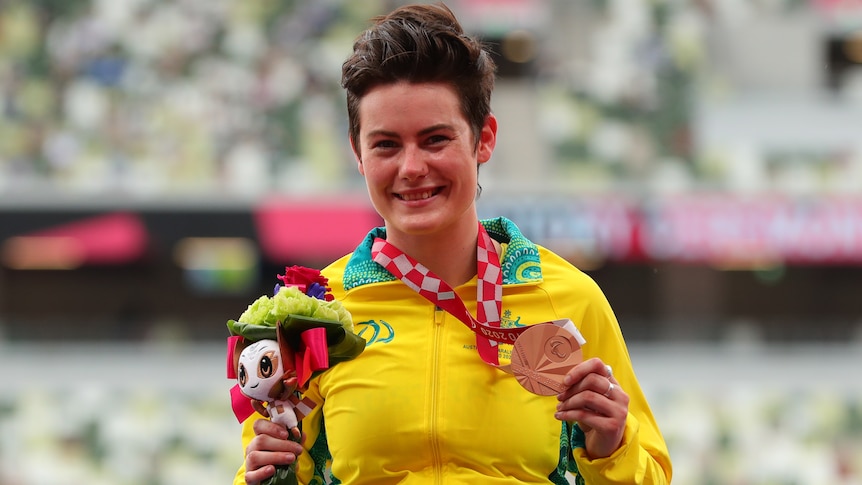“What happened to you?”
“Jesus can heal you.”
“Can you have sex?”
“You’re pretty for someone in a wheelchair.”
Believe it or not, these are all things Robyn Lambird says strangers have said to them.
loading
But they’ve embraced their profile as a Paralympian to shatter misconceptions and make their mark on and off the race track.
The beauty in disability and diversity
Lambird is a non-binary wheelchair racer from Perth, and made their Paralympic debut at Tokyo last year, winning a bronze medal in the T34 100m final.
Their immediate focus is the Commonwealth Games in Birmingham where they’ll contest the women’s T33/34 100m.
It will hold special significance for the England-born sprinter to compete in front of family members, including both sets of grandparents, for the first time.
The 25-year-old also competes in the national wheelchair rugby league, studies digital and social media at university, and has built an impressive following online as a content creator and activist.
Lambird’s Instagram account is full of engaging posts, educating, entertaining, and illuminating.
It ranges from fashion tips to training diaries, to important messages around queer pride and disability awareness.
Lambird has cerebral palsy, and one of the clear messages they want to get across is that disability isn’t a dirty word.
loading
“I think on some level in our society, we still see disability as this inherently negative thing,” Lambird said.
“[The idea that] this tragedy happened to someone and that’s why we shy away from the word disabled, and all of these other euphemisms, differently abled.
“But, to me, the word disabled is a source of pride because I’m proud of who I am now. And everything that I’ve done in my life, I’ve done with my disability, not despite it.
“It’s not our bodies that make us disabled at the end of the day, it’s the opportunities that we don’t have or it’s because the world is not accessible to us.”
Lambird says it’s up to everyone to advocate for people with a disability.
“If you as an able-bodied person go into a cafe, and you realize that it’s inaccessible, maybe ask why that’s the case? Or what can be done to make that environment accessible?,” they said.
“And if you notice that there’s no disabled people in your workplace, maybe you should be questioning that, why isn’t there opportunities for people with disabilities to get into those spaces?”
Role model for queer community
Lambird is also passionate about standing up for the queer community, something which has taken more prominence since they became the first out non-binary athlete to win a Paralympic medal in Tokyo.
“I think afterwards, I realized how important that was… in terms of helping other people to feel welcome in the sporting environment and to know that they have a future in the sport, if that’s what they want, and that they can they can be themselves,” they said.
loading
“That’s the thing that I really love about sport is it has this opportunity to bring people together to create this great sense of community.”
Lambird’s positive experiences in sport started in wheelchair rugby, which is a mixed gender sport.
They think it’s worth exploring whether more sports can follow its lead, to make it more inclusive for trans and gender diverse people.
“I just think everyone should have the opportunity to go to reap the benefits of sport, both mentally and physically,” they said.
“Sport has changed my life and has given me so many things, and I couldn’t imagine not being in the position that I am now.
“So I think we really just need to start sitting down and having conversations about how we can open that up to everyone and ensure that everyone feels like they have a place.”
There is no normal: finding a community online
Social media is an important part of Lambird’s life, giving them the opportunity to tell their own story, which is often overlooked by the mainstream media.
loading
“Any media that focuses on disability and tries to accurately portray that experience is important, but the people that really know what it’s like to live with a disability and to navigate the world as a disabled person are disabled people.
“And having that opportunity to take control of that narrative, and to show what disability looks like for us, and what is our truth, it’s incredibly important.”
Lambird still has a long sporting career ahead of them, but they have an eye on the future as well, and their ability to create lasting change.
“I think I always just find the beauty in diversity. Diversity is one of the world’s greatest teachers, I think we can learn so much about the world and our place in it just by listening to others,” they said.
“I’ve been very lucky to find an amazing community online and on social media, people that are just trying to lift each other up regardless of their gender or sexuality or their disability.
“And I think it’s challenging that idea that, there is not normal.”
Lambbird will compete in the T33/34 women’s 100m at the Commonwealth Games on Wednesday August 3 AEST.
.
